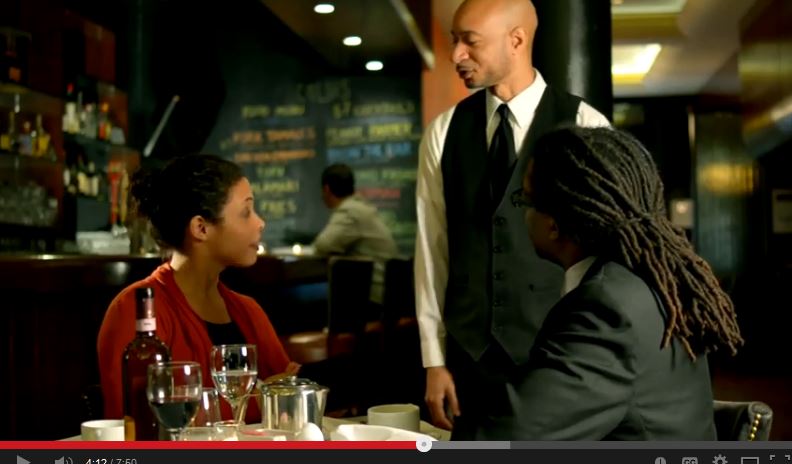Tidbits - December 19, 2013
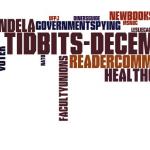
- Re: The Backroom Deal That Could've Given Us Single-Payer - response to Scott Alarik - Tidbits - Dec. 12 (Eliot Katz)
- Re: Socialism: Converting Hysterical Misery into Ordinary Unhappiness (Karyne Dunbar)
- Re: UIC Faculty Union Flexes Muscles in Showdown Over Adjunct Pay (Max Shaw)
- Re: Is NATO's Trojan Horse Riding Toward the 'Ukraine Spring' (Aaron Libson, Bill Harvey, Moderator's Note)
- Re: The Great American Class War (Al McLaine)
- World's Leading Authors: State Surveillance is Theft (Morris Edward)
- Re: Venezuela's Nicolás Maduro Cements Power With Victory in Local Elections (Claire Carsman)
- Re: Turning Mandela (Chris Lowe)
- Re: Nelson Mandela - Letter to the New York Times (Victor Grossman)
- Re: South African Communists Hail Nelson Mandela (Sandra Rivers, Lincoln Smith)
- Re: MSNBC Hosts Quiet in Union Dispute, AFL-CIO Suggests (Frank Moody)
- Re: From Berlin - Fast Food and Slow Decisions (Leonard J. Lehrman)
- After 18 Months, Iowa Investigation Finds A Voter Fraud Rate Of .00075 Percent
- New book, "Rosa Luxemburg: Her Life and Legacy"
- Diners Guide to Ethical Eating for 2014 (ROC United - Restaurant Opportunities Centers United)
- Jobs with Justice - 25 Years! Read the Book! (Paul Garver)
- A Letter from Leslie Cagan, Phyllis Bennis, Bill Fletcher & Other UFPJ Founders
As a supporter of single-payer health care, I wanted to respond to one of your recent reader's comments. Scott Alarik writes that: "The Affordable Care Act is exactly what Obama campaigned on in 2008. Agree or disagree, no honest journalist can write about the issue without acknowledging this." But that is not quite the case. During the 2008 primary campaign, the health-care reform proposals offered by Barack Obama and Hillary Clinton were very similar, with the biggest difference being that Barack Obama opposed the idea of an individual mandate, saying that it wasn't necessary for his plan to work. Somehow, that individual mandate--which attempts to force many people who cannot afford it to buy private health insurance policies from for-profit companies that far too often look for reasons to deny treatment coverage--was later put into the president's plan, without ever a word of personal explanation or apology from the president as far as I have e seen, and with very few commentators pointing this out. The Affordable Care Act includes some positive eIements, in terms of expanding access, and some problematic elements. Personally, I hope that the recent glitches in implementing the law will get more people looking again at single-payer as by far the most moral and practical solution to our nation's health care crisis.
Eliot Katz, poet
Re: Socialism: Converting Hysterical Misery into Ordinary Unhappiness
Cutting out the insurance companies and creating a single payer system was considered too radical for Obama to try for. It most likely would have eliminated most of what is undesirable about the ACA. Maybe next try?
Karyne Dunbar
Re: UIC Faculty Union Flexes Muscles in Showdown Over Adjunct Pay
(Portside Labor posting)
I worked near slave wages for 6 and a half years at the College of Charleston in South Carolina and the faculty of the so-called progressive department did nothing. I made lots of noise and eventually in 2005 lost my contract. I was 56 and I haven't worked full time since then. The academy in general is failing the social contract. Bravo/brava IUC.
Max Shaw
Posted on Portside's Facebook page
Re: Is NATO's Trojan Horse Riding Toward the 'Ukraine Spring'
Missing in all the uproar about the Ukraine is the fact that if the wishes of the "opposition" were to come about that country would be hit by a double whammy! First, as a debtor nation they would face the same EU scrutiny as Greece, Spain, Portugal and Ireland . Wait till these demonstrators would confront EU administered austerity! It would be compounded by harsh terms from their energy supplier , Russia. Russia would certainly view this as a slap in the face and would exact harsh terms. With these two dire prospects the Ukraine would face severe economic doldrums and years of unrest and recrimination.
Aaron Libson
====
READERSUPPORTEDNEWS gives Dennis Kucinich as the author of this article.
Bill Harvey
[Moderator's Note: Many thanks to the number of readers who wrote about this. This has been corrected on the Portside website.]
Re: The Great American Class War
Bill Moyers: always thoughtful and provocative
Al McLaine
Posted on Portside's Facebook page
Re: World's Leading Authors: State Surveillance is Theft
Where do I sign? I am not a writer but, when I email someone I expect them to be the (only one) that will read it. This must be addressed by the world as soon as possible. This is truly 1984.
Morris Edward
Re: Venezuela's Nicolás Maduro Cements Power With Victory in Local Elections
Don't know a whole lot about Maduro in Venezuela. What I do know, unfortunately, is that the US will do everything they can to discredit, and possibly, as in Chile, work to overthrow his and Cesar Chavez' government.
Are we going to send the pots and pans there?
Claire Carsman
Thanks for this article and information on the sources. It has been my impression that Mandela was functioning as a broker among factions in the crucial negotiations period. Steve Weissman portrays him as much more of an agent of the shift. That may be true. I will read further with interest.
However, it deserves to be noted that left critics of the SACP in the 1980s (and before), some Trotskyist, some independent socialists, often aligned with more "workerist" trade unions, in the language of the day, predicted pretty much this outcome of the SACP's two stage theory of revolution. Under that theory, the national democratic revolution would precede the socialist revolution in a sharply distinguished way, and the task of socialists primarily was to build the national democratic revolution. As the critics pointed out, this built an essentially populist mass political alliance, ed in politics primarily by people coming from the repressed petty bourgeoisie. While apartheid was in place, the racist repression drove the African and other black petty bourgeois' overwhelmingly into alliance with the working class, which probably obscured the day to day risk. Mandela the lawyer and Sisulu the trade unionists worked hand in glove. But once a "transition" was in train, the outreach by the big bourgeois' to embrace and turn and co-opt into themselves formerly petty bourgeois new allies out of the liberation movement was both predictable and predicted.
I am not sure that a strategy based on a "single stage" socialist revolution would have build a mass movement as well did the ANC and SACP through the UDF, eventually joined by the COSATU unions despite substantial concerns among their ranks. Dogmatism among the SACP's critics might have proved self-limiting. It is in the nature of counterfactuals to be uncertain.
It does seem clear to me that dogmatism on the SACP side in strict adherence to Stalinist theories about race and class, that focused excessively on seeing race through the lens of "the national question," and giving mechanistic priority to "the national democratic revolution," going back to 1928, obstructed strategic and political nimbleness. Perhaps it blocked or distracted from preparation that might have been done within the Mass Democratic Movement in the 1980s to meet the coming blandishments from big money and create structures to hold leaders accountable to workers.
Unfortunately the split between the UDF and formations united in action with the Black Consciousness Movement which criticized the two stage theory during that period limited the reach of that critique and action to answer it. Some aspects of that split relate to characteristics of "democratic centralism," especially dogmatism and lack of leadership accountability, as it evolved in both the Stalinist and Trotskyist branches of Leninism. It did so in ways more consequential than the feuding of micro-sects in the U.S., where it arises in our country today most directly, though there was more to the split than that.
Chris Lowe
Portland, Oregon
Re: Nelson Mandela - Letter to the New York Times
Letter to the Editor (They answered that if I didn't get word they were using it in 3 days I can send it elsewhere - which I do here)
Before Mandela's story drops from the headlines, one sideline deserves mention. On June 9th 1953, Secretary-General Walter Sisulu of the African National Congress (at whose wedding Mandela was best man) sent this message to the chairman of the Council on African Affairs, none other than the black leftist actor and singer Paul Robeson: "The African National Congress highly appreciates the good work and tireless efforts made by your Council in educating our American Negro Brothers and the public of America as a whole. We also express our gratitude for the assistance you have given us in our Campaign for the Defiance of Unjust Laws." The Council, founded in 1937 by Robeson and W.E.B. Du Bois and forced to disband in the McCarthy era, was of key importance in telling the truth on oppression of Africans and fighting for support of the ANC despite the UN adopting a pro-apartheid status quo policy in post-war years. Robeson was never allowed to visit South Africa, where his records were banned. But even before the war, according to US and UN diplomat Ralph Bunche, among black South Africans "when one mentions American Negroes they all chorus: Paul Robeson and Joe Louis..." And Robeson's smuggled records were enjoyed by Mandela and the others on Robben Island. .
Victor Grossman
First director, Paul Robeson Archive, Academy of Arts, (East) Berlin
PS. Ralph Bunche also wrote that more sophisticated black South Africans spoke not only of Robeson and Joe Louis but also added Jesse Owens and Duke Ellington. (The story comes from Paul Robeson Jr.'s book about his father, "The Undiscovered Paul Robeson).
Re: South African Communists Hail Nelson Mandela
What oozes out of this SACP statement is much self-congratulatory rhetoric and very little SPECIFICS as to CONCRETE accomplishments that have impacted the quality of life for the millions of poor, working South African People; not a word of even regret for the nearly 50 miners who were SLAUGHTERED, Apartheid-Sharpeville 1976 style - under the ANC--Jacob Zuma "leadership." Not a sentence on why the ANC has utterly FAILED to counter the 1st or 2nd greatest inequality gap on the planet. Not a sentence of even an attempt to explain away or counter Zuma's reported $20 million expenditure on a compound reportedly for HIS family. I could go on and on.
It is incumbent upon progressives everywhere - to confront and acknowledge egregious contradictions, and indeed mistakes (which the SACP narcissistically "doesn't make"). Those who otherwise posture themselves are not at all serious about revolutionary change - no matter how slow we may be in bringing it about.
It is dismaying that the ANC and the SACP may have become the counterpart to the u.s. Democratic Party.
Sandra Rivers
====
What happened to Joe Slovo? I had always thought he was a major leader of the SACP, but no mention of him in this statement.
Lincoln Smith
Re: MSNBC Hosts Quiet in Union Dispute, AFL-CIO Suggests
After see how the workers are treated at the Washington,DC O&O [owned & operated] I'm not at all surprised. The "news department" uses " contract workers" that never get more than 39 hours a week .Then some of them were outsourced to a computerized e-network that needed less "contract" workers.So the surplus was given the boot. And since they were nothing but "contract workers" - They got nothing.
When suggested that what was happening to them was a news story, all you got was blank stares and silence. So I would expect nothing less from the " stars of the NBC"left". So the Peacock busting up the workers and fighting to keep their work force docile punks is not new.
Just hope you have some talking heads with guts. But I doubt it.
Walter Moody
Re: From Berlin - Fast Food and Slow Decisions
I remember Augsburg well, having worked at the theater there in 1980, fondly revisiting in 2000. An opera of mine, KARLA, was translated there and almost given its European premiere there - twice: once in July 1980, when a baritone's illness caused its cancellation; once a few years ago, when it was considered by the current theater regime, but alas not done (yet).
(You can read about it and watch the orchestral premiere on video,
I also remember the landmark(s) at the center of town: For decades, one would hear: "Meet me at Koenigsplatz." But around the time I got there, it had become: "Meet me at MACdonalds!" (with the stress on the first syllable, of course).
Schoene Gruesse! -
Leonard J. Lehrman
After 18 Months, Iowa Investigation Finds A Voter Fraud Rate Of .00075 Percent
By Aviva Shen
December 17, 2013
Think Progress
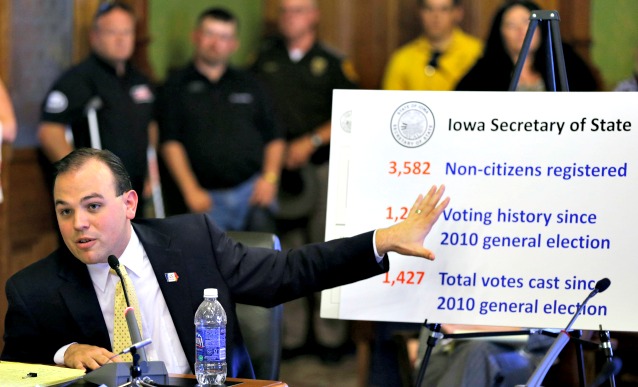
Iowa Secretary of State Matt Schultz (CREDIT: AP)
After 18 months and repeated insistence by top officials that voter fraud is rampant, Iowa's voter fraud investigation has essentially gone nowhere. The Des Moines Register reported Monday that the investigation, which has cost the state about $150,000 so far, has unearthed a total of 16 cases for criminal prosecution.
Five of these cases have been dismissed, while five others have resulted in guilty pleas. Three guilty pleas were submitted by felons who thought their voting rights had been automatically restored upon getting out of prison, as they would have been before a 2011 executive order by Gov. Terry Branstad (R).
Branstad claimed last year that many Iowans "falsely vote in an area where they're not eligible" while pushing for a voter ID law that makes voting disproportionately harder for people who are poor, non-white, or elderly. Secretary of State Matt Schultz (R), who spearheaded the investigation, has also long argued that the state has a voter fraud problem. He told the Des Moines Register that the 16 cases - which account for .00075 percent of Iowa's registered voters - prove that voter fraud exists.
However, many of the cases that have not already been dismissed appear to be motivated more by confusion than criminal intent. One woman who pled guilty cast an absentee ballot for her daughter, because her daughter was worried she would not have time to register to vote after a recent move. Another inadvertently registered to vote while getting a state ID card, and was trying to fix the situation himself when he was ensnared by the investigation, according to his attorney. None of the cases have gone to trial yet.
Other states have also come up mostly empty-handed, despite lawmakers' claims of a voter fraud epidemic. Ohio's probe similarly turned up voters who were given bad instructions by pollworkers, thought their absentee ballot had gotten lost in the mail, or were simply confused. Colorado has also found a handful of potential perpetrators of voter fraud, many of whom ended up being legitimate voters. An independent investigation in Arizona found just 34 cases of mostly misinformed illegal voters over 8 years. A Florida hunt for illegitimate voters turned up a single non-citizen voter from Canada.
New book, "Rosa Luxemburg: Her Life and Legacy"
"As the global economic crisis brought about a reinvigorated analysis of Marxist and socialist study, a reevaluation of Rosa Luxemburg's political philosophy and cosmopolitan pedagogy emerged as an important consideration within the global resurgence in socialist thought. This rethinking of socialism and assessment of Luxemburg's legacy engendered much debate within the pages of New Politics in summer of 2001, creating a space for dialogue that appraised and evaluated socialist metaphysics, human emancipation, and Luxemburg's legacy within the canon of political philosophy. In this volume, Jason Schulman has put together the debates from New Politics into a comprehensive title-providing a revised, expanded outlet for the engaging scholarship that emerged from the journal's pages. Featuring new content and an interview with a leading political theorist, the book casts new light on the debate over Marxist approaches to societal ills while assessing the politics of socialism."
The book can be ordered, in the U.S., from here.
New Politics, the journal, can be found here.
Diners Guide to Ethical Eating for 2014
Our Diners Guide to Ethical Eating for 2014 is OUT today.
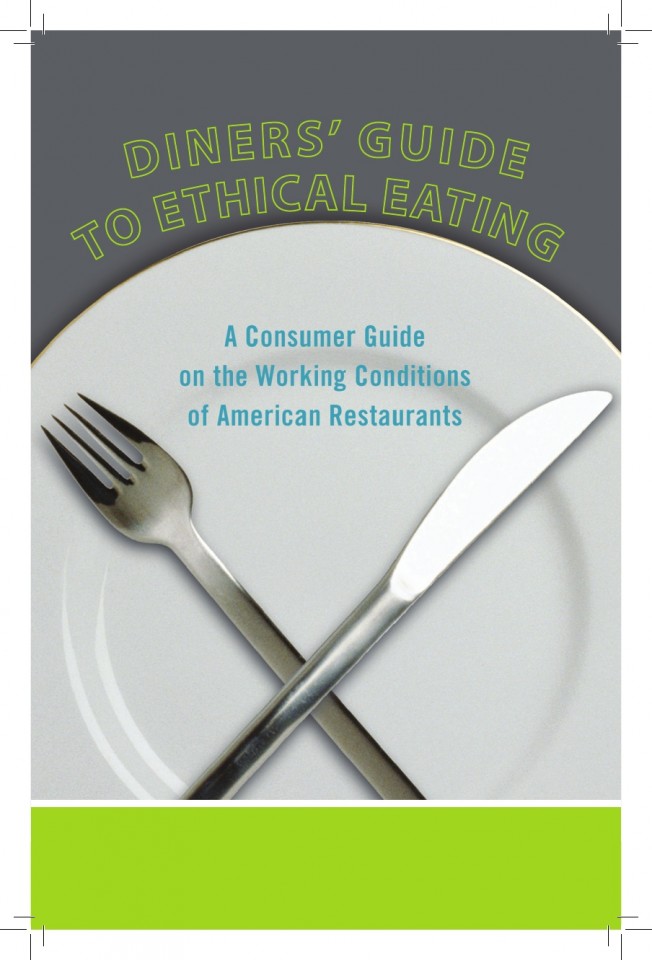 00
00
If you live in one of these major cities: NYC, Chicago, Houston, Miami, DC, Philly, LA, Oakland, New Orleans or Detroit, use the guide to learn where your favorite restaurant stands on wages, paid sick days, and internal advancement opportunities!
Remember, this isn't about boycotting any restaurant... stand with workers by speaking up for living wages and fair labor conditions whenever and wherever you eat!
Want to help us spread the word?
- Tweet this: Make 2014 the year labor conditions are included in defining "sustainable food" w/ @rocunited's Diners Guide
- Share this facebook photo on your wall!
Thank you for your support!
ROC United - Restaurant Opportunities Centers United
Unfortunately, the workers who cook, prepare, and serve restaurant goers suffer from poverty wages, a lack of basic benefits like paid sick days, and often have little or no chance to move up to better positions.
Available as a free app for iPhone & Android, PDF guide and consumer toolkit
Download the guide as a PDF here.
Download the consumer toolkit to spread the word.
*Exciting updates to this app will be complete over the next couple months! -
New for 2014 - share your experiences using the guide here!
This guide isn't about boycotting certain restaurants. We want you to continue to dine at your favorite restaurants, but if they don't score well in the guide (or are absent altogether), we want you to tell the restaurant owners that fair wages, access to paid sick days and internal advancement opportunities are important to you. If they are high road restaurants, they're deserving of praise!
Do this in a few ways:
1. Have a conversation with restaurant management, check out the video to see how it's done.
2. Leave behind a note, as simple as "noticed you still pay the subminimum wage of $2.13/hour to your tipped workers, as a frequent customer I'd love to see that raised!"
3. Send a constructive tweet or facebook comment their way (easier if you download our Diners Guide app)
4. Enjoy reviewing restaurants? Be sure to include your knowledge of the restaurant's labor practices in your review.
5. Feeling especially pumped about standing up for higher wages and more just labor practices? Please join The Welcome Table, an association of eaters across the country joining forces to hold the restaurant industry accountable to sustainable labor practices.
Jobs with Justice - 25 Years! Read the Book!
By Paul Garver
December 16, 2013
Talking Union
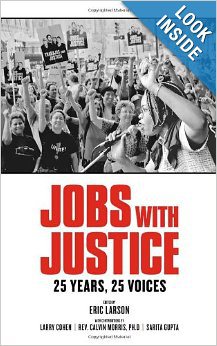
Jobs with Justice: 25 Years, 25 Voices. Edited by Eric Larsen (PM Press, 2013)
As an occasional historian, I cannot do justice to the richness contained in these interviews and essays that reflect upon the experiences over 25 years of diverse community, labor, immigrant and student activists that have built the local Jobs with Justice coalitions at grassroots levels. Read the book!
As a reviewer, I will call particular attention to the introduction by IUE-CWA President Larry Cohen and the concluding essay by Sarita Gupta, the current Executive Director of Jobs with Justice (JwJ).
No one in the national labor movement can match the perseverance of Larry Cohen, whose vision founded Jobs with Justice, and whose commitment to building that organization never faltered when other union leaders wavered.
The nationally networked local coalitions that make up JwJ have had their share of both failures and successes, but over a generation they have waged worker-community struggles based on the principle of mutual solidarity. The model was a hybrid of organizations and individual activists, based on a solidarity pledge to "be there" for others as needed.
If the AFL-CIO has now come to proclaim its adherence to these ideas, it is not only out of desperation, but out of a collective practice and habits built over decades by JwJ coalitions in communities throughout the country.
The essay by Sarita Gupta projects this model into the future. Her goal is "to build the biggest and broadest alignment of unions and organizations committed to advancing the interests of the whole working class." No organization across the progressive spectrum can do this alone. Building an inclusive and comprehensive movement requires a strategy based on collaboration among many organizations to develop effective interventions.
Jobs with Justice remains well positioned to help carry out this ambitious program nationally and in many localities. This book demonstrates how in recent years JwJ coalitions have developed new ties to activist immigrant and student organizations and JwJ has increasingly recruited staff and leadership from these crucial sectors. As we collectively think about the next steps to building a better Left presence in the USA, reflect upon the people and their experiences in Jobs with Justice, 25 Years, 25 Voices.
A Letter from Leslie Cagan, Phyllis Bennis, Bill Fletcher & Other UFPJ Founders

Dear Friend of United for Peace and Justice,
Let's not beat around the bush. We're writing this letter to encourage you to make a donation to United for Peace and Justice, a generous donation. http://org.salsalabs.com/dia/track.jsp?v=2&c=mGiCccP9l3%2BFyhRZBfScWg1n…
As the world watched the U.S. get ready to go to war against Iraq, we were part of the small group that convened in the fall of 2002 to say something had to be organized in the U.S. to stop this madness. A great deal of anti-war sentiment was already being voiced, so there was a reason to be optimistic about creating a new, nationwide coalition. What we didn't know then was that the ground we were breaking would lead to the largest peace coalition in this country's history.
At its height, UFPJ had some 1,400 member groups - both national organizations and local groups, groups that were decades old along with those just forming. We were able to do some amazing things over those years: organize the largest mobilizations against the war in Iraq; give support to those in the military opposing the war along with those working to end the economic draft; develop working groups that included coalition members and addressed a range of issues from the attack on civil liberties, to the bloated military budget and the urgent need to fund social programs at home, to linking the struggle for climate justice to the work for peace; and much more. Several of UFPJ's working groups have remained strong over the years, still bringing together people from around the nation to develop resources, organizing materials and common programmatic work. This includes the Nuclear Disarmament/Redefining Security, the Legislative and the Jobs Not War working groups.
There is something else, something less tangible, that UFPJ has provided. The work of previous years laid the foundation for more recent important efforts. For instance, a few months ago the U.S. was poised to take military action in Syria, action that could have easily escalated into regional warfare with the U.S. in the middle of it all. But the quick action of the peace movement (and others) helped make visible the widespread public opposition to such action. There are at least two things that made it possible to move quickly and effectively:
- in no small measure, our collective work against the war in Iraq had taught us valuable lessons about how to pressure Washington, and
- a set of relationships between organizations had been built by working together in the UFPJ coalition and we could skip the getting-to-know-one-another phase of movement work.
Of course, it's no secret that UFPJ is not the same coalition it once was. The world has changed in the 11 years since it was created, and activism has taken new twists and turns. Over the years, UFPJ has shifted from a coalition structure to being more of a network that shares information and affords opportunities for groups that want to work together on specific issues and projects to do just that. An infrastructure has been built and this is no small feat, nor something that should be given up lightly.
Now, the current leadership of United for Peace and Justice is once again struggling with hard questions: what is needed, how can this network make the most effective contribution, how to maintain a structure that both serves the work of today and could be the foundation for something larger and more powerful in the future? One critical task they have taken on is checking in with the hundreds of local groups and national organizations that still view themselves as part of UFPJ to see what they need and what they might contribute. This work is well underway, but it will take some time before the project in completed.
While that all unfolds, UFPJ needs your help--more specifically, it needs your financial support! We know this is the time of the year when virtually every organization is asking for donations, and we know you are probably already giving to many groups. Nonetheless, we hope you will take a moment to recall the incredible work done by UFPJ over the years, take stock of the ongoing efforts UFPJ is giving leadership to, and consider what it would mean to lose the structure that has been built over the years.
Yes, it is that serious. Without your support - and the support of others in every corner of the country - the future of UFPJ is in danger. There are many things we would love to have disappear from the planet - senseless wars, theft of resources, nuclear and other weapons of mass destruction, corporate greed and control over the lives of so many, racial and gender hatred and violence, degradation of the Earth and our climate. But losing UFPJ doesn't make a whole lot of sense, and it's totally preventable, if you take action today.
We hope you enjoy the holidays and we look forward to standing with you - and UFPJ - in the year ahead as we take on the next phases in the struggles for peace and justice.
Yours,
Leslie Cagan - UFPJ National Coordinator 2002-2008
Bill Fletcher, Jr - Racial Justice, Labor and International Activist
Phyllis Bennis - Director, New Internationalism Project, Institute for Policy Studies
Van Gosse - Co-Founder, Historians Against the War
John Cavanagh - Director, Institute for Policy Studies
Steve Cobble - Co-Founder of Progressive Democrats of America
Click Here to Donate!
Donations to United for Peace and Justice are tax exempt to the extent permitted by law. The Fellowship of Reconciliation (FOR) is UFPJ's 501(c)3 fiscal sponsor. If you would like to make a donation by check, please make it payable to "FOR" and write "UFPJ" in the memo line.
Mail to: UFPJ c/o Fellowship of Reconciliation, 521 N. Broadway, Nyack, New York 10960.

